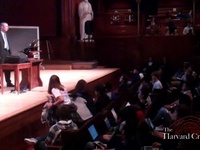Many undergraduates remained skeptical of the demonstration’s mission.
Mark S. Krass ’14 said he believes the walkout’s intended goals were unclear, which detracted from the walkout’s message and comprises its integrity.
“Those of us who are supportive of Occupy Wall Street are trying very hard to combat the view that there is no set of objectives or ideology motivating that movement,” Krass said. “It was really distressing for people to advertise a walkout of Ec 10 on the basis of high textbook prices and bad teaching.”
Jeremy Patashnik ’12, an economics concentrator who authored a lengthy piece in defense of the course for the Harvard Political Review, rejected the notion that Ec 10 carries a conservative bias.
“I self-identify as a liberal on these issues, and I don’t see the conservative bias. I think this walkout misses the point of what Ec 10 is supposed to be,” Patashnik said. “This class is not attempting to give normative answers about how to address social issues. It’s meant to introduce students to economics as a social science.”
Krass noted that the topic of Wednesday’s lecture—income inequality—might have been particularly interesting to those who participated in the walkout.
“It’s incredible that in the name of advancing a more liberal view of economics they chose to walk out of a class on a social issue they care about,” Krass said.
According to those who walked out, part of the discontent with Economics 10 stems from what they say is the limited number of opportunities to express skepticism toward the material taught in the course.
“I’ve definitely written question marks in my textbook, but we never really get to question [what he says] in section,” said Alexandra E. Foote ’15, who is currently enrolled in the course. “I don’t know very much about economics, and it’s not really fair that I’m getting a skewed perspective.”
—Staff writer Jose A. DelReal can be reached at jdelreal@college.harvard.edu.












